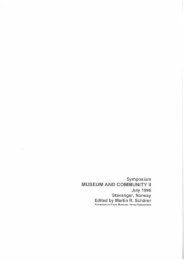Key Concepts of Museology - ICOM
Key Concepts of Museology - ICOM
Key Concepts of Museology - ICOM
You also want an ePaper? Increase the reach of your titles
YUMPU automatically turns print PDFs into web optimized ePapers that Google loves.
52<br />
sory perception, experiment, and<br />
study <strong>of</strong> its constituent parts. This<br />
scientifi c perspective conditions the<br />
objective and repeated study <strong>of</strong> the<br />
thing which has been conceptualized<br />
into an object, beyond the aura<br />
which obscures its meaning. Not<br />
contemplating, but seeing: the scientifi<br />
c museum not only displays beautiful<br />
objects, it invites the visitor to<br />
think about their meaning. The act<br />
<strong>of</strong> musealisation leads the museum<br />
away from being a temple to make it<br />
part <strong>of</strong> a process which brings it closer<br />
to the laboratory.<br />
CORRELATED: COLLECTING, COMMUNICATION,<br />
DISPLAY, DOCUMENT-OBJECT, HOARDING, MUSEALIA,<br />
MUSEALITY, MUSEUM OBJECT, PRESERVATION, RESEARCH,<br />
RELIC, SELECTION, SEPARATION, SUSPENSION.<br />
MUSEOGRAPHY<br />
(MUSEUM PRACTICE)<br />
n. (derived from Latin museographia) – French<br />
equivalent: muséographie, Spanish: museografía;<br />
German: Museographie; Italian: museografi<br />
a; Portuguese: museografi a.<br />
The term museography fi rst appeared<br />
in the 18 th century (Neikel, 1727) and<br />
is older than the word museology. It<br />
has three specifi c meanings:<br />
1. Currently museography is<br />
essentially defi ned as the practical<br />
or applied aspect <strong>of</strong> museology, that<br />
is to say the techniques which have<br />
been developed to fulfi l museal operations,<br />
in particular with regard<br />
to the planning and fi tting out <strong>of</strong><br />
the museum premises, conservation,<br />
restoration, security and exhi-<br />
bition. In contrast to museology,<br />
the word museography has long<br />
been used to identify the practical<br />
activities associated with museums.<br />
The term is regularly used in the<br />
French-speaking world, but rarely in<br />
the English-speaking one, where<br />
museum practice is preferred. Many<br />
museologists from Central and Eastern<br />
Europe have used the term<br />
applied museology, that is to say, the<br />
practical application <strong>of</strong> techniques<br />
resulting from the study <strong>of</strong> museology,<br />
a science undergoing development.<br />
2. In French the use <strong>of</strong> the term<br />
museography identifi es the art (or<br />
the techniques) <strong>of</strong> exhibitions. For<br />
some years the term expography<br />
(exhibit design) has been proposed<br />
for the techniques involved in exhibitions,<br />
whether they be in a museum<br />
or in a non-museal space. Generally<br />
speaking, what we call the ‘museographical<br />
programme’ covers defi nition<br />
<strong>of</strong> the contents <strong>of</strong> the exhibition<br />
and its requirements, as well as the<br />
functional links between the exhibition<br />
spaces and the other museum<br />
areas. This defi nition does not mean<br />
that museography (museum practice)<br />
is defi ned only by that part <strong>of</strong> the<br />
museum which is seen by the visitor.<br />
Museographers (museum designers<br />
or exhibit designers), like other<br />
museum pr<strong>of</strong>essionals, take into<br />
account the scientifi c programme<br />
and collection management, and aim<br />
to display the objects selected by the<br />
curator in a suitable manner. They<br />
must know methods <strong>of</strong> conserva-
















